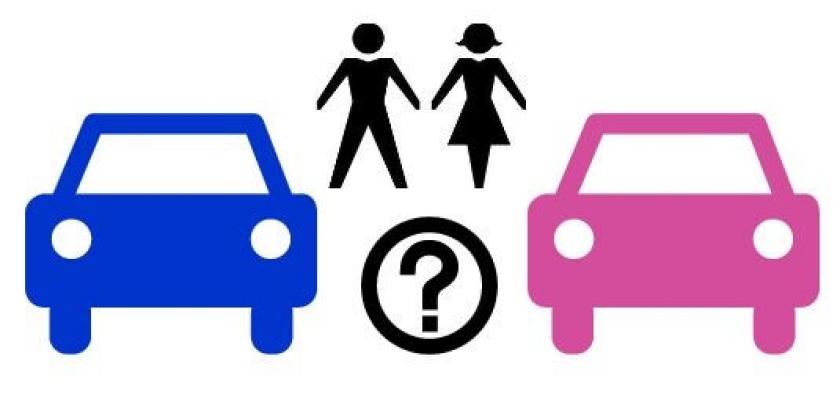Various studies conducted in Europe and the world show that transport is not gender neutral, that women and men have different needs and mobility patterns, and that inadequate transport systems can limit women’s access to education, economic opportunities and health care and influence the deepening of gender inequality.
In order to check the “travel” habits of women and men in Bosnia and Herzegovina – how often they drive a car, what they most often use it for and whether they feel safe in traffic, etc., the Helsinki Citizens’ Assembly and the Center for the Environment are, in the period from March to May 2023, organized an online survey that was completed by 4862 people, of which 3618 were women (74.4%) and 1244 were men (25.6%).
Most of them (71.6%) are active drivers who use a car every day; 21.2% of them use it only occasionally, while 7.3% drive only on rare occasions.
Among those surveyed, there are the fewest “inexperienced” drivers, that is, those who have just passed their driving test (11%). Most of them are in the group of those who have had a driver’s license for between 2 and 5 years (36%) and for more than 10 years (30%).
The responses of those surveyed showed that half of them (51%) drive cars that are registered in someone else’s name.
| Cars driven in Bosnia and Herzegovina are mostly registered to men. The answers of those surveyed show that 1179 vehicles are registered to husbands or fathers, compared to only 290 of those registered to mothers and wives. |
The data on whose middle name it is speak in favor of the still strong patriarchal patterns according to which the man (father, husband, brother, father-in-law, etc.) is the one who disposes and manages the property.
Namely, in 82% of cases, the car is registered in a man’s name – in the largest number of cases, the cars are registered to the husband / partner (678) or father (501), and some of them are also registered to the father-in-law (15), as well as to uncles (11), sons (4), sons-in-law (2), and brothers-in-law (2).
In the structure of female ownership, mothers predominate – in 245 cases the car is registered to the mother, followed by wives – 45 and sisters – 43. In two cases, the car is registered to daughters, and in 4 to “mistresses”.
When it comes to the most common reasons for using a car, the largest number of respondents use a car to go to work and to go shopping. However, gender patterns are observed here too, according to which the role of women is primarily reduced to taking care of others (the home, the children) and which suggest that women are the ones who more often use the car for shopping, but also for taking and bringing children from school or some other extracurricular activities.
| Women use the car more than men to make purchases and take their children to and from. |
Namely, of the 3,618 women who filled out the survey, 1,271 or 35% of them use a car to drive children, in contrast to 28% of men who use a car for the same purposes. When it comes to purchases, 79% of women versus 70% of men use a car to go shopping.
The fact that even 28.6% or 1,392 respondents do not feel safe in traffic is worrying. The most common reasons cited were other negligent and nervous drivers, fast driving, bad roads, lack of traffic culture, and a considerable number of them also mentioned excessive use of mobile phones while driving.
Among the answers to why they do not feel safe, there were also the following:
“Some drive as if they don’t have a driver’s license and as if they have two lives.”
“The infrastructure in Banja Luka does not support cycling and I am afraid that I will hit one of them”.
“Failure to follow regulations, speeding, the rule of ꞌadvantages of newer carsꞌ”.
“People are ashamed to blink, dad’s sons drive angry cars without thinking about the consequences, traffic in Sarajevo from 2:00 pm to 6:00 pm is chaos…”
As for travel habits, 60.3% of respondents combine city driving and longer distances in their driving, and when they go on a trip with a partner, 35.7% of respondents change with their partner in the role of driver during the drive.
46.5% feel safe driving in larger and more densely populated cities, while 26% of them do not feel safe. When asked whether weather conditions affect the decision whether to drive, 66.6% claim that it does not affect their decision, while 25.4% avoid driving in bad conditions.
One of the questions also related to the experiences of taking the driving test. Most of them had a positive and correct experience (94.8%), while 5.1% of them had a negative experience.
In several individual responses, respondents claimed that the commission asked them for a bribe, and sexist comments about female drivers were also recorded.
Some of them were: “Women’s place is in the kitchen”, “Practice it a little more with your brother and maybe you will be able to do it yourself”, “Without a good lunch, you will not pass the first time”, “The examiner stated that women need more time to learn how to change gears and look at rear-view mirrors”, “How can a woman apply for a truck…”, “It’s not for you, leave it”.
The majority still actively drive, and the reasons for stopping active driving are as follows: 31% because their partner needs a vehicle, 22% because of the high cost of fuel and 19% because of fear. A significant number of “other” reasons referred to pregnancy and childbirth as a reason for stopping active driving.
When it comes to other types of transportation or habits, 60% of respondents mostly walk, 28.2% use public transport, and 10.2% use bicycles.
In general, although the number of female drivers increases from year to year, certain gender patterns are still observed in the “travel” habits of women and men – women use cars more often than men to drop off children and for shopping, the cars they drive are registered in a large number of cases on their husbands or fathers, and continue to encounter sexist comments about female drivers.
Photo: www. rivervaleleasing.co.uk









